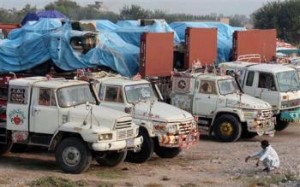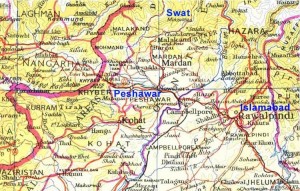Pakistan Turns Attention to India, Ignores Radicalization Within
BY Herschel SmithIn Pakistan Declares Baitullah Mehsud Patriot we warned that the Taliban and even the power structure within the Army might use the Mumbai attack in India to turn attention away from the Taliban and towards India.
While the new Pakistan administration sees the need for the war against the Taliban and al Qaeda, the Pakistan Army mostly doesn’t and wishes not to be fighting their own people. The Army also has an almost pathological preoccupation with India, and the rumblings in India over the Mumbai attacks have given both the Pakistan Army and the Tehrik-i-Taliban the perfect cover to end their cooperation with the U.S. and NATO over the Taliban safe haven in the Pakistan FATA and NWFP.
The cultural milieu is amenable to this persuasion to distrust India.
Fateh Khan doesn’t know much about the fight against terrorism. He doesn’t know much about the attacks that killed more than 170 people in Mumbai last week, either. But if there is one thing the Pakistani taxi driver feels sure about, it’s that after three wars, India — not terrorism — remains the No. 1 threat to his country.
“Every Pakistani is clear that India is the enemy state,” Khan said. “Pakistan has always tried to live at peace with India. But India has not tried for peace.”
As we forecast, the Taliban are indeed using the Mumbai incident as a means to turn attention away from themselves and towards India, even offering to assist the Pakistan Army in a fight with India.
Taliban fighters battling Pakistani soldiers near the Afghan border volunteered Tuesday to fight alongside the army if war breaks out with traditional foe India over the Mumbai attacks.
Analysts say the offer is meant to fan the flames of anti-Hindu sentiment and draw support away from Islamabad’s fight against al-Qaida and Taliban militants in the tribal regions close to Afghanistan.
The government, which is appealing for calm, has not responded to it.
“That is what they would love, to see the attention of the Pakistan army shift from the tribal areas to the eastern border with India,” said defense analyst Hasan Askari Rizvi.
The Taliban’s offer came in a video recording by its deputy chief, Maulvi Faqir Mohammad, that was made available to reporters Tuesday.
“If India launches a war on Pakistan, we will divide the fight into two parts. The air defense will be the responsibility of the military, and the Tehrik-e-Taliban Pakistan will fight the war on ground,” he said. “If it makes a mistake to attack Pakistan, Tehrik-e-Taliban will defend Pakistan and Islam.”
Pakistan still doesn’t understand the internal threat posed by the Tehrik-i-Taliban. Brothers in religious persuasion – maybe or maybe not. But they are certainly not interested in Pakistan staying status quo in the future.
We have discussed and detailed the Talibanization of Karachi, and Peshawar was essentially Talibanized a half year ago. The extent of Taliban influence is now even expanding to Lahore. But a vivid indication of just how deep the dark underworld goes into the Pakistan power structure is seen in the recent execution of a former Pakistani General.
A top former Pakistani army officer, who was the brother-in-law of Indian-origin novelist and Nobel laureate V S Naipaul, was murdered after he “threatened” to expose Pakistani Generals for ‘deals’ with Taliban militants, a media report said today.
Major-General Faisal Alavi, a former head of Pakistan’s special forces who was murdered last month in Islamabad, had named two generals in a letter to the Pakistani army chief Ashfaq Kayani and had said he would “furnish all relevant proof,” the report said.
Alavi, brother of Naipaul’s wife Nadira, did not live to fulfil it. Aware that he was risking his life, Alavi gave a copy of the proof to a Sunday Times correspondent and asked him to publish it if he was killed.
Four days later, he was driving through Islamabad when his car was ambushed by another vehicle. At least two gunmen opened fire from either side, shooting him eight times killing him and his driver, the paper said.
The letter from Major-General Faisal Alavi is available in PDF format. The rot runs deep within Pakistan, and yet the attention of the country, much like that of the taxi driver, is squarely on India. Pakistan is currently in dire danger and may cease to exist as a viable democracy, and yet the Pakistan Army wants to fight with India and the population is, generally speaking, willing to suffer the Taliban and acquiesce to their rule. It is a dark day in Pakistan, and while very few signs of real resistance to the Taliban are forthcoming, time is short to stem the tide of radicalization of an entire nation.






